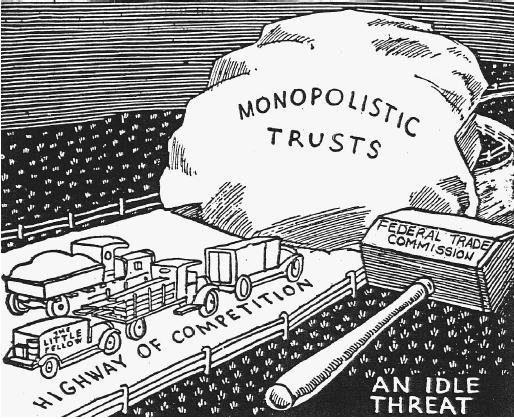Online Marketing FTC Rules
For most online marketers the Federal Trade Commission (FTC) looms large. It’s the bogieman, Big Bad Wolf and judgmental Santa Claus all balled up into one. Even if you run the tightest ship in the green coffee, diet pill business you cannot escape its reach. So with that in mind, Internet Attorney, Andrew Jaffe wrote a super informative 3 part series on some the most critical laws established by the FTC regarding on-line advertising and marketing.
In this first installment, Jaffe defines what the FTC is and does and gives a general overview of how the FTC operates. If you take nothing else from reading this know that, from the FTC’s perspective, there is no “little guy.” When it comes to government regulation, there might be “Too Big to Fail” but there is no, “Too Small to Prosecute.”
By Andrew Jaffe
The Federal Trade Commission (FTC) regulates much of what is done on the Internet. Today’s FTC overview is the first of three parts which will continue with a blog about the FTC regulations themselves, and finally, a blog about the FTC’s testimony and endorsement rules.
When the FTC was created in 1914, its purpose was to prevent unfair methods of competition in commerce as part of the battle to “bust the trusts” (like Standard Oil.) Over the years, Congress passed additional laws giving the agency greater authority to police anti-competitive practices.

In 1938, Congress passed a broad prohibition against “unfair and deceptive acts or practices.” Since then, the Commission has also been directed to administer a wide variety of other consumer protection laws, including the Telemarketing Sales Rule, the Pay-Per-Call Rule and the Equal Credit Opportunity Act. In 1975, Congress gave the FTC the authority to adopt industry-wide trade regulation rules.
Most people don’t realize that the regulations published by our regulatory agencies have the effect of law just as much as a law passed by our congress. When the congress creates a government agency they grant the agency broad powers including the ability to promulgate and enforce regulations. The enabling act for the agency provides that these regulations will have the same effect as a law passed by congress.

We call this area of law “administrative law” and there are about 50 U.S. agencies that publish regulations. Besides the FTC we have the FDA, the EPA, the FCC and the IRS, just to name a few.
The regulations are printed in the CFR, the Code of Federal Regulations. The same consumer protection laws that apply to commercial activities in other media apply online. The FTC Act’s prohibition on unfair or deceptive acts or practices also encompasses Internet advertising, marketing and sales.
Section 5 of the Federal Trade Commission Act grants the FTC power to investigate and prevent deceptive trade practices. The FTC has determined that a representation, omission or practice is deceptive if it is likely to mislead consumers and affect consumers’ behavior or decisions about the product or service.

I have heard Internet marketers comment that the FTC won’t waste their time on the “little guys” and will focus their attention on the big players. I find this comment from Internet marketers hilarious as these are the same people who spend thousands of dollars and considerable time on making sure their key words give them a top ranking – and then they think of themselves as flying under the radar when in actuality it is their top ranking that will draw the attention of the FTC.
The FTC is the main consumer protection agency in the United States. Their mission is to protect the consumer and they take that mandate seriously, particularly in the areas of false or deceptive advertising. It has been my experience that the FTC will pursue anyone they can find regardless of size.
Why the FTC pursues some marketers and not others is not always clear.
Sometimes the FTC has received complaints about a particular site or product. Other times, the FTC determines a particular product area is ripe for their regulation. If you go the FTC’s web page located at ftc.gov you will see what areas the FTC is most concerned about. Products such as diet supplements or pills (both organic and medicinal), debt reduction plans, investment and opportunity plans and work from home schemes all have significant FTC comments. These are the areas the FTC is most likely to pursue without specific complaints.
The FTC locates Individual Internet Marketers in one of two ways. First, when the FTC finds a web site they wish to pursue, they first check the “who is” listings of the domain. Since legitimate business people have a true and accurate “who is” listing the FTC has an easy time of finding them.
Other marketers are perhaps less scrupulous about their domain listings, and the FTC will follow a transaction to find who receives the money. In both situations, the FTC will have an employee sign up for product at the web site and complete the purchasing transaction. They will then follow the money and focus on who received the funds. Further, they make copies of the web site, the ordering pages, the confirmation, and anything else they can find which can later become evidence of the transaction.
The FTC Act prohibits unfair or deceptive advertising in any medium. That is, advertising must tell the truth and not mislead consumers. A claim can be misleading if relevant information is left out or if the claim implies something that’s not true. For example, a lease advertisement for an automobile that promotes “$0 Down” may be misleading if significant and undisclosed charges are due at lease signing.
In addition, claims must be substantiated, especially when they concern health, safety, or performance. The type of evidence may depend on the product, the claims, and what experts believe necessary. If your ad specifies a certain level of support for a claim – “tests show X” – you must have at least that level of support.

Sellers are responsible for claims they make about their products and services.
Third parties, such as advertising agencies or website designers and catalog marketers, also may be liable for making or disseminating deceptive representations if they participate in the preparation or distribution of the advertising, or know about the deceptive claims. Further, the FTC went so far recently as to prosecute a company that hit the like button on Facebook for a consumer’s comments on the company’s products when the company could not substantiate the claims made by the consumer.
Advertisements may contain disclosures which prevent an ad from being misleading. However, these disclosures must be clear and conspicuous. In evaluating whether disclosures are likely to be clear and conspicuous in online ads the FTC will consider the placement of the disclosure and its proximity to the relevant claim.
To make a disclosure clear and conspicuous, advertisers should; place disclosures near the triggering claim, and when possible, on the same screen; and advertisers should use text or visual cues to encourage consumers to scroll down a Web page when it is necessary to view a disclosure so it is not hidden “below the fold.” When using hyperlinks to lead to disclosures place the hyperlink near relevant information and make it noticeable.
The courts use the litmus test of conspicuous whenever evaluating Internet activity. Further, advertisers should prominently display disclosures so they are noticeable to consumers, and evaluate the size, color and graphic treatment of the disclosure in relation to other parts of the Web page. Web sites should repeat disclosures on lengthy Web sites and in connection with repeated claims.
The FTC periodically joins with other law enforcement agencies to monitor the Internet for potentially false or deceptive online advertising claims. If your advertisements don’t comply with the law, you could face enforcement actions or civil lawsuits. For advertisers under the FTC’s jurisdiction, that could mean: orders to cease and desist with fines up to $16,000 per violation, and in some instances refunds to consumers for actual damages.
And…with discussion of steep fines, that concludes this first of 3 blog posts about the FTC. Stay tuned for the next edition in which Jaffe digs into BIZ OPP REGULATIONS! Cue the shower scene music from Psycho.
To find out more about Attorney Jaffe click on over to his site: http://www.netlaws.us/


